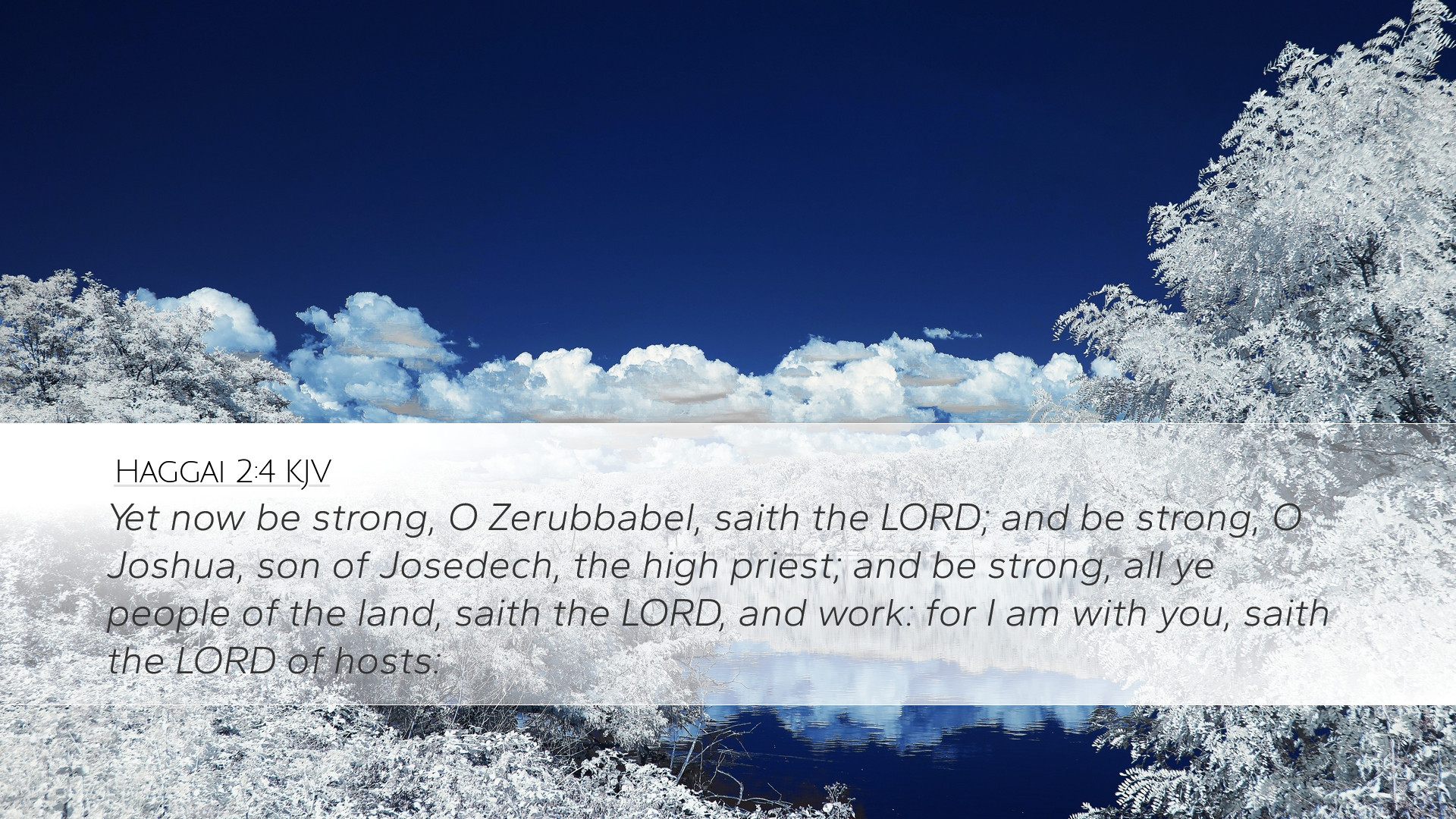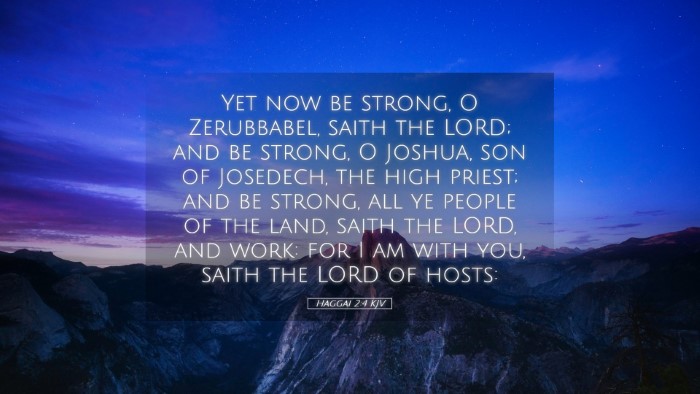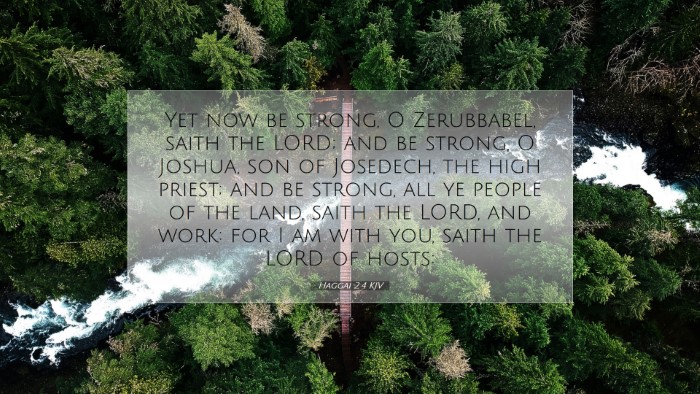Old Testament
Genesis Exodus Leviticus Numbers Deuteronomy Joshua Judges Ruth 1 Samuel 2 Samuel 1 Kings 2 Kings 1 Chronicles 2 Chronicles Ezra Nehemiah Esther Job Psalms Proverbs Ecclesiastes Song of Solomon Isaiah Jeremiah Lamentations Ezekiel Daniel Hosea Joel Amos Obadiah Jonah Micah Nahum Habakkuk Zephaniah Haggai Zechariah MalachiHaggai 2:4
Haggai 2:4 KJV
Yet now be strong, O Zerubbabel, saith the LORD; and be strong, O Joshua, son of Josedech, the high priest; and be strong, all ye people of the land, saith the LORD, and work: for I am with you, saith the LORD of hosts:
Haggai 2:4 Bible Commentary
Commentary on Haggai 2:4
Haggai 2:4 presents a powerful exhortation to the leaders and people of Judah, encouraging them to act in faith during a time of uncertainty and challenge. The verse reads:
"Yet now be strong, O Zerubbabel, saith the Lord; and be strong, O Joshua, son of Josedech, the high priest; and be strong, all ye people of the land, saith the Lord, and work: for I am with you, saith the Lord of hosts."
Contextual Background
The prophecy of Haggai was given during a time when the Jewish people were returning from Babylonian exile and faced great obstacles in rebuilding the temple. This period was marked by discouragement due to external opposition and internal apathy.
Exegesis of the Verse
Each segment of Haggai 2:4 has significant implications for the people at that time, but also provides timeless truths applicable to believers today.
1. Strength and Encouragement
“Yet now be strong, O Zerubbabel”
- Zerubbabel, as the governor, symbolizes leadership and political authority. His divine commissioning reflects God's empowerment for his leadership role.
- Be strong is a repeated encouragement, emphasizing the need for courage amidst adversity. This call is not only personal but communal, urging all to rise despite challenges.
2. The Role of the High Priest
“be strong, O Joshua, son of Josedech, the high priest”
- This address highlights the dual leadership of both civic and spiritual authority. Joshua’s role as high priest signifies the necessity of spiritual renewal alongside physical rebuilding.
- Joshua’s faithfulness in spiritual matters is essential for the people’s overall strength. The call to be strong invokes the priest to lead the community in faithfulness and worship.
3. Community Involvement
“and be strong, all ye people of the land”
- The mention of the entire community emphasizes collective strength and unity in undertaking God’s work. It conveys that every member holds responsibility in the rebuilding process.
- It speaks to the entirety of the community, not just the leaders, reinforcing the idea that the work of God is a shared mission requiring the strength and effort of all.
4. Divine Presence and Assurance
“for I am with you, saith the Lord of hosts”
- This phrase serves as the central assurance and foundation for their strength. The presence of God is a promise of support and is crucial for the undertaking of daunting tasks.
- God is addressed as “the Lord of hosts”, reflecting His supreme authority over all creation, His might, and His unfailing commitment to His people.
Theological Implications
The message of Haggai 2:4 extends beyond its immediate context to provide deeper theological insights relevant for Christian life and ministry.
1. The Nature of God’s Call
God’s call for strength and action reiterates that divine mandates often come with challenges. Yet, they are accompanied by divine assurance. This serves as a reminder that believers are called to courageous action, bolstered by faith in God's presence.
2. Leadership and Responsibility
The shared responsibility between Zerubbabel and Joshua, alongside the people, illustrates a model for leadership within the church. Leaders are to inspire and mobilize, but every believer has a part to play in the fulfillment of God’s mission.
3. Community and Unity in Christ
In the context of the Body of Christ, this call to strength and unity emphasizes that all members are vital. Each believer is called to contribute their gifts and strength to the collective work of the Church.
4. Assurance in God’s Presence
The promise of God's presence reassures believers that their labors are not in vain. Whatever trials may come, the assurance of divine support fortifies hearts and spirits to continue forward in faith.
Conclusion
Haggai 2:4 encapsulates a message rich with encouragement for believers of all generations. The call to strength, the acknowledgment of leadership, the emphasis on community, and the promise of divine presence together outline a powerful framework for understanding our response to God’s calling in the face of adversity. As we reflect upon these truths, we are reminded that God's promises redeem our struggles, and His presence empowers our work.


